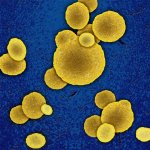
Ventilation-associated pneumonia
Every year in German hospitals about 15,000 patients acquire ventilation-associated pneumonias (VAP). This number, and the associated mortality, is striking enough to make it one of the topics at HAI 2010, the annual conference of the German Society for Anaesthesiology and Intensive Care Medicine (DGAI). Like many physicians, Dr Maria Deja, senior physician at the Charité Clinic for…



















